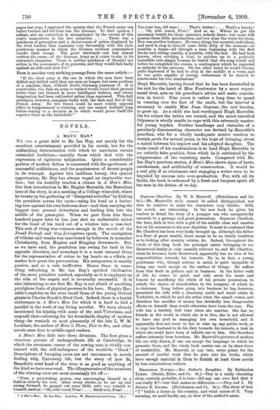Seymour Charlton. By W. B. Maxwell. (Hutchinson and Co. 6s.)—Mr.
Maxwell's style cannot be called distinguished, nor does he contrive to make his characters very lifelike. Still, his novels are interesting. In his new book he gives his readers in detail the story of a younger son who unexpectedly succeeds to a peerage and great possessions. Seymour Charlton, the hero, falls in love with a girl of the middle class and marries her on his accession to his new dignities. It must be confessed that Mr. Charlton has been very badly brought up. Although his father is a Peer of great wealth, there seems to be no family tradition as to looking after country estates, &c. Indeed, throughout the whole of this long book the principal estate belonging to the Brentwood family is only casually referred to, and Mr. Charlton, when he becomes Lord Brentwood, apparently has no idea of his responsibilities towards his tenants. He is, in fact, a young gentleman who, though serious in mind, is quite incapable of doing any work except on the surface of things. He suffers from this fault in politics and in business. In the latter walk of life he comes to grief, and only saves his name and honour by sacrificing the whole of his private possessions to satisfy the claims of shareholders in the company of which he is chairman. Long before going into business he has, however, presented his wife with a charming castle and small estate in Yorkshire, to which he and she retire when the smash comes, and therefore his sacrifice of money has decidedly less disagreeable effects on himself than would otherwise have been the case. The wife has a terribly dull time when she marries. She has no friends in the world in which she is to live, she is not allowed to have any part in managing her own household, and it apparently does not occur to her to take up any public work, or to urge her husband to do his duty towards his tenants, a task in which she could have been of infinite use to him. She therefore starers intensely from boredom. Mr. Maxwell's pictures of modern life are ably drawn, if one can accept the language in which he presents them, and the whole book carries one on by sheer force of readability. Mr. Maxwell, at any rate, earns praise for the amount of careful work that he puts into his books, which have enough material in them to furnish at least three novels by less conscientious writers.






























































 Previous page
Previous page